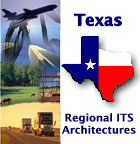

|

|

|

|

|

|

|

|

|

|
TxDOT Corpus Christi Traffic Signals Equipment Packages |
 |
The following equipment packages are associated with the "TxDOT Corpus Christi Traffic Signals" element. Select the "Details" icon to see the detailed process specifications that support each equipment package, or consult the National ITS Architecture web site for more information.
Roadway Equipment Coordination
![]()
This equipment package coordinates field equipment that is distributed along the roadway by supporting direct communications between field equipment. This includes coordination between remote sensors and field devices (e.g., Dynamic Message Signs) and coordination between the field devices themselves (e.g., coordination between traffic controllers that are controlling adjacent intersections.).
This Equipment package provides the capability for control of reversible lanes using sensor and actuator type equipment. This Equipment package also provides the capability to notify users the direction of the reversible lanes using electronic lane signs.
This Equipment package provides the capabilities to control traffic signals at major intersections and on main highways for urban areas. This Equipment package is generally constrained to a single jurisdiction.
This Equipment Package manages highway traffic at highway-rail intersections (HRIs) where operational requirements do not dictate advanced features (e.g., where rail operational speeds are less than 80 miles per hour). Either passive (e.g., the crossbuck sign) or active warning systems (e.g., flashing lights and gates) are supported depending on the specific requirements for each intersection. These traditional HRI warning systems may also be augmented with other standard traffic management devices. The warning systems are activated on notification by interfaced wayside equipment of an approaching train. The equipment at the HRI may also be interconnected with adjacent signalized intersections so that local control can be adapted to highway-rail intersection activities. Health monitoring of the HRI equipment and interfaces is performed; detected abnormalities are reported through interfaces to the wayside interface equipment and the traffic management subsystem.
 Web Spinner Technology.
Web Spinner Technology.